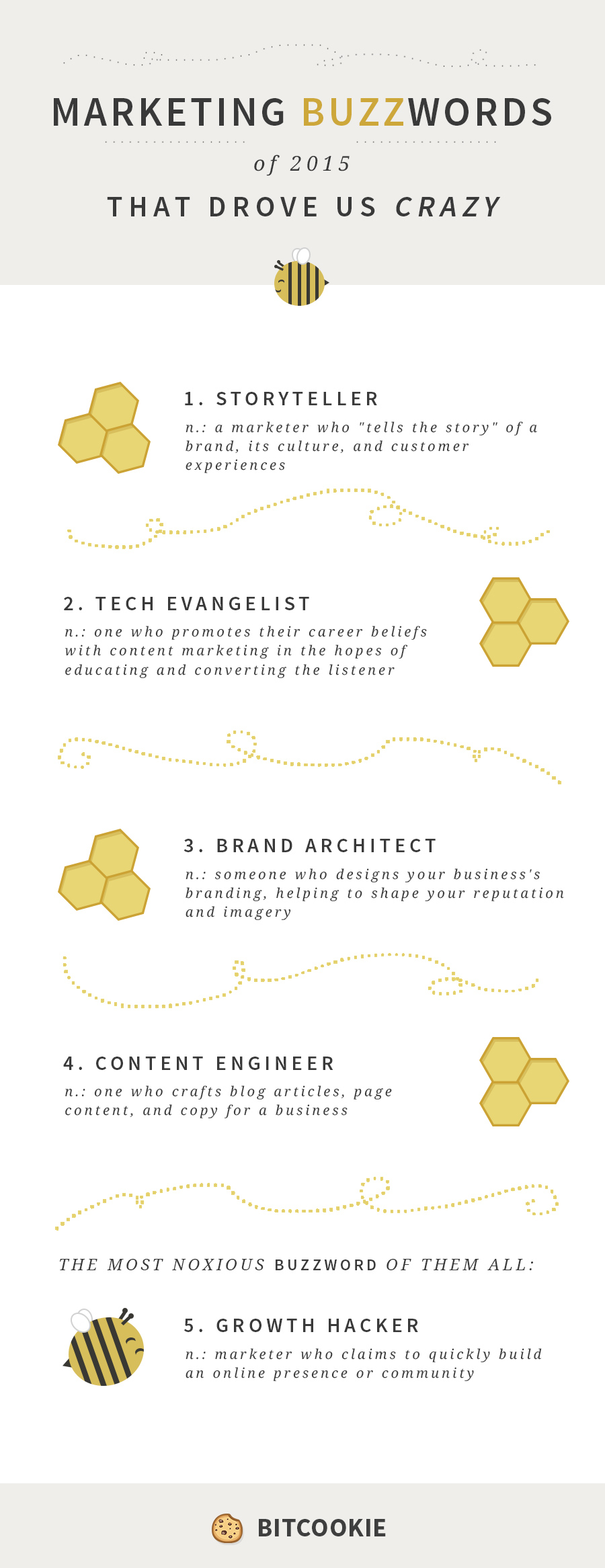Marketing Buzzwords of 2015 That Drove Us Crazy
Internet marketing continues to grow each year. In fact, digital ad spending in the United States is to surpass television ad spending in 2016. With this continued growth in online marketing, content creators and social media experts look for more ways to set themselves apart and sound unique, turning to these (now commonplace) buzzwords.
The problem with marketing buzzwords is that lofty jargon pushes customers away from your business.
Here's our list of marketing buzzwords from the past year that drove us crazy or gave us a good chuckle, and why they're silly or downright problematic:

1. Storyteller
Definition: a marketer who "tells the story" of a brand's culture, or shares other people's experiences with the brand

Stories about company culture and customer experiences are great, but the term storyteller is vague and represents just one piece of content marketing. To separate this as an entire field of its own is like saying you work in SEO but you only work with metadata.
The first time someone threw out "I'm a storyteller" in conversation, everyone in the room thought they were working on a novel, asking questions about their genre or style of writing. After a few minutes, they gave up on the jargon and explain flatly "I'm a marketer."
If it takes this long for a potential client to understand what your job title really is, then it is too vague.
2. THE "CAREER Evangelist" - Marketing Evangelist, Tech Evangelist, etc.
Definition: one who promotes their career beliefs in the hopes of educating and ultimately converting the listener.

Using the term "technology evangelist" sounds like tech is your religion, and that you hope to convert someone to your beliefs. A little aggressive, no?
Instead, leave your career title in your biography in layman terms, and share educational content about your industry. This will still help others understand the importance of your job without it feeling too preachy.
3. BRAND ARCHITECT
Definition: someone who designs your business's brand, shaping your reputation and imagery

This is more direct and appropriate than "logo designer" but lofty titles like this confuse your audience. Think: What is your potential client searching for? Is your buzzword title too esoteric for them to find you?

Still, I agree that brands are more than just logo design and typography, so architect is a pretty fitting word. Dang. This one may be here to stay...
4. Content Engineer
Definition: one who crafts blog articles, page content, and copy for a business. From wikipedia: one who works with "the use of content in computer-facilitated environments"

It's a trend lately to add engineering to the end of everything. Personally, I dream of becoming a waffle engineer. Mm...
The most noxious buzzword of them all...
5. Growth Hacker
Definition: a marketer who claims to quickly build an online presence or community

Here's why this is the most problematic buzzword:
1. Community growth is a slow process, and almost all business owners accept this.
Most of the businesses we consult with are fine with the time commitment that inbound marketing requires. Often, they've also been around long enough to receive penalties for having outsourced, paid backlinks from the pre-Penguin days. They even joke about how there's no quick way to the top.
2. "Hacking" has a negative connotation to many business owners.
Nearly every business at some point has received an email from a website security company threatening to exploit "security flaws" in their site unless they pay the company to fix it. Hacking has become a curse word to business owners. Many design studios even have policies of never using the h-word. Hacking is the new cheating.
Combined into the buzzword "Growth hacking," it sounds as though a marketer will cheat your company into hundreds of paid followers, rather than organically growing a community using your natural brand appeal.
3. There are no shortcuts to growing a community.
Paid Facebook advertisements result in low engagement, and this affects your (already restricted) reach.
Veritasium, a Youtube channel that shares videos on science and engineering, paid for Facebook ads: "When I paid to promote my page I gained 80,000 followers in developing countries who didn't care about Veritasium (but I wasn't aware of this at the time). They drove my reach and engagement numbers down, basically rendering the page useless."
4. Everything a "growth hacker" does is just inbound marketing.
Appealing to industry leaders, republishing content, tagging users, running campaigns - this is all still content marketing.
What do I do? I love these buzzwords!

That's okay. Instead of using these buzzwords in your job title, make yourself relatable and understandable. It's alright to use these terms with context in any content you work on - though, you may still want to avoid throwing around provocative terms like hacking.

